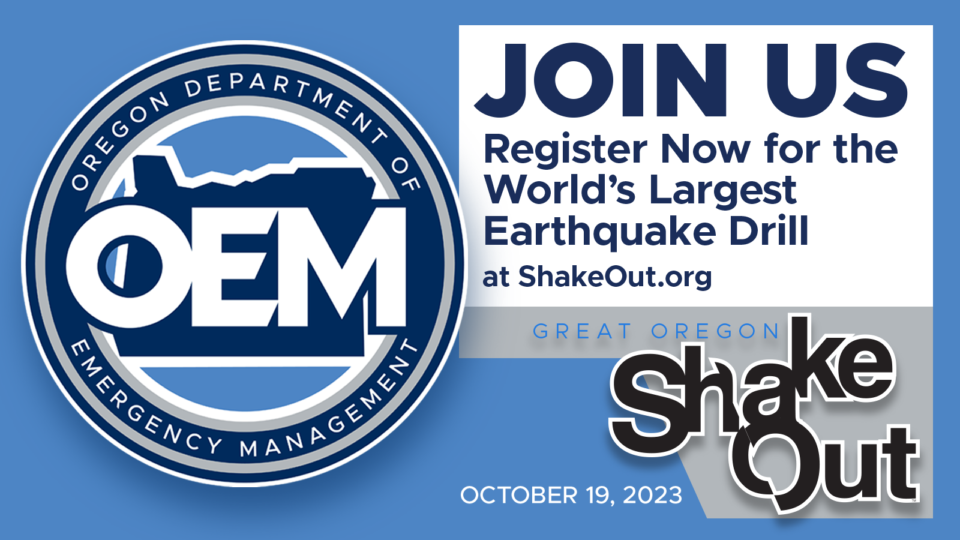WHAT
The Great Oregon ShakeOut is part of an annual global self-led drill that encourages people to prepare for and practice how to stay safe during an earthquake. Nearly 600,000 Oregonians have already registered at ShakeOut.org to take part in this year’s event.
WHEN
This year’s Great Oregon ShakeOut earthquake drill will take place at 10:19 a.m. on Thursday, Oct. 19.
WHERE
ShakeOut is a self-led drill; no matter where you are this Thursday at 10:19 a.m. PT, you should Drop, Cover and Hold On for one minute as if an earthquake were happening at that time.
- Drop immediately onto your hands and knees. This position protects you from being knocked down and allows you to stay low and crawl to a nearby shelter. If you use a wheelchair or walker, lock your wheels.
- Cover your head and neck with one arm and hand. If a sturdy table or desk is nearby, crawl underneath it for shelter. This protects you from objects that might fall or topple over, such as unsecured items on shelves, ceiling fans, bookshelves or televisions, and other debris. If there is no nearby shelter, crawl next to an interior wall away from windows. Cover your head with your arms. Remain on your knees and bend over to protect vital organs.
- Hold On until the shaking stops. If under a shelter, such as a desk or table hold onto it with one hand and be ready to move with it as the ground moves up and down and side-to-side. If there is no shelter, hold onto your head and neck with both arms and hands.
Drop, Cover and Hold On is the national standard for earthquake safety and evidence suggests it offers the best overall level of earthquake protection in most situations, including from falling and flying debris and other nonstructural hazards.
OTHER ACTIONS
Other important no- and low-cost actions people can take to reduce their risk include signing up to receive local emergency alerts at ORAlert.gov; creating and practicing a household emergency plan; making an emergency kit with enough food, water and critical items for each person and pet in the household to survive for two weeks; and enabling Wireless Emergency Alerts (WEA) on mobile phones. People in Oregon who’ve opted into WEA automatically receive ShakeAlert earthquake early warning notifications for earthquakes in their area with a magnitude of 4.5 or greater, which can offer critical seconds of warning to seek cover from falling objects and brace themselves.
EARTHQUAKES IN OREGON
Oregon is one of the most earthquake-prone areas in the continental U.S., with several fault lines that cause dozens of earthquakes every year. The most known earthquake threat is the Cascadia Subduction Zone, a 700-mile fault located off the Pacific coast that puts Oregon at risk for a 9.0+ magnitude earthquake. A quake of that size could cause five to seven minutes of shaking, followed by a tsunami of up to 100 feet in height that would devastate coastal areas.
INFO
Learn more and register for the Great Oregon ShakeOut at ShakeOut.org.
Learn how to Be 2 Weeks Ready at Oregon.gov/OEM.
###
Great Oregon ShakeOut infographics in English and Spanish provided by the Oregon Department of Emergency Management.
School for footage/interviews on Oct. 19. Arrive between 9:45 and 10 a.m.
Portland-area media are invited to Robert Gray Middle School at 5505 SW 23rd Ave., 97239. Please RSVP with Valerie Feder, Portland Public Schools Communications Department, 917-923-3638 (talk and text) or vfeder@pps.net.









